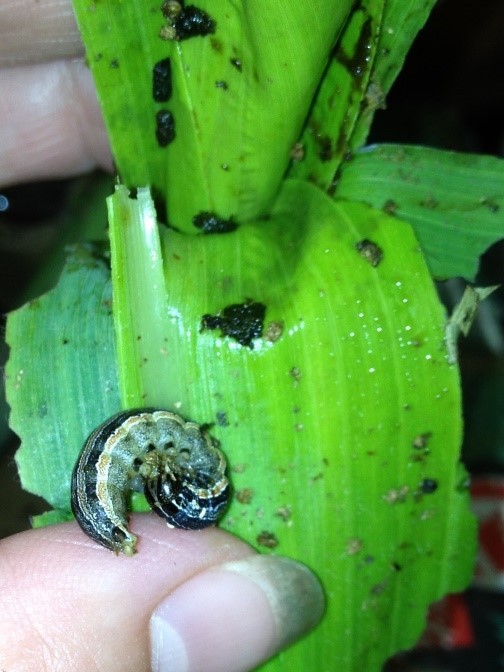True Armyworms Invading Sweet Corn!
Chuck Bornt, Team Leader, Extension Vegetable Specialist
Eastern New York Commercial Horticulture
This article was published in the June 7th 2018, ENYCHP Vegetable News. Click here to view the full newsletter.
The last two weeks have had us finding some True Armyworm adult moths in our traps. These moths move up from southern overwintering sites on storm fronts. If you recall, we've had some issues with these buggers in the past and sweet corn isn't their only host as we've seen them attack several vegetable crops including sweet corn, brassicas, tomatoes, peppers and greens. Not only is their damage a problem, but on things like lettuce, the droppings can affect marketability of the crop.
Armyworms, whether Fall or True, are very eager feeders and can do a lot of damage in a short time. Their feeding damage tends to appear ragged, with large holes eaten in the leaves and they leave lots and lots of sawdust looking frass (insect terminology for fecal matter). They tend to feed on the top sides of crops during the night and on the undersides or deeper into the plant during the day.
The adults are fairly large moths which are primarily nocturnal and have the ability to lay up to 2,000 eggs in their two week life. The eggs will hatch in 7 to 14 days and the larvae begin feeding immediately, going through seven stages of development over several weeks. The worms tend to be greenish brown (with some variations) with a pale white stripe on its back and an orange stripe on each side of the body. One other distinguishable feature is a dark brown to black triangle located on the outside of each of the four pairs of prologs found towards the hind end of the body.
Thresholds for when to treat corn have been established and should be treated when 25>#/b### of the plants are showing damage (Source: Integrated Pest Management Program, Missouri University). For sweet corn and leafy greens, best control is achieved when the larvae are small (1st and 2nd instar) and applied usually later in the evening when the larvae tend to be more active and feeding on the upper surfaces of the plants.
There are a number of insecticides labeled for leafy greens including these organic products: Pyganic (pyrethrin), Dipel (Bacillus thuringinensis, subsp. Kurstaki), Xentari ((Bacillus thuringiensis, var. aizawai), Aza-Direct (azadirachtin), Azera (pre-mix of azadirachtin and a pyrethroid) and Entrust (check the label for the labeled rates as formulations vary for these products). Again, these products are going to work best when applied to small larvae but if they get ahead of you, tank mixing a pyrethroid (Aza-Direct, Pyganic etc.) with a Bt (Dipel, Xentari etc) will improve performance. Repeat applications may also be necessary depending on how long the egg laying period and development conditions are.
Conventional insecticides labeled for armyworm control on sweet corn and leafy greens including Warrior II, Baythroid (both are recommended for 1st and 2nd instars), Coragen and Lannate. Ensure that you get thorough coverage, of the canopy with any of these products including the whorl in the case of sweet corn. Late evening applications also keep insecticides wet longer ensuring larval contact and ingestion of the insecticides. Other insecticides labeled for sweet corn include Asana XL (1st and 2nd instars), Mustang Max, Radiant SC and Blackhawk. Please check labels for rates.
 Note the ragged feeding and dark colored frass. (Photo: Teresa Rusinek)
Note the ragged feeding and dark colored frass. (Photo: Teresa Rusinek)
Upcoming Events
Vegetable Field Meetings with Dr. Steve Reiners
July 14, 2025 : Herkimer County - Ivan Martin's Farm
Herkimer, NY
Topics: Tomato Fertility and Mitigating Physiological Disorders; Pest Scouting, ID, and IPM Field Walk.
July 15, 2025 : Washington County - Hand Melon Farm
Greenwich, NY
Topics: Tomato Fertility and Mitigating Physiological Disorders, Tomato and Sweet Corn IPM; FSMA Water Assessments and Postharvest Sanitation
July 16, 2025 : Ulster County - Wallkill View Farm
New Paultz, NY
Topics: Tomato Fertility and Mitigating Physiological Disorders; Veg Pest Update and Management; Cornell Tomato Breeding Program and Slicer Tomato Variety Trial Tour
2025 Berry Twilight Meetings
July 2, 2025 : Berry Twilight Meeting at Dressel Farms
New Paltz, NY
Join Heather Kase, CCE ENYCHP, and Anna Wallis, Cornell IPM, for seasonal updates on berry pest man-agement and IPM.
July 16, 2025 : Berry Twilight Meeting at Samascott Orchards
Kinderhook, NY
Join Heather Kase, CCE ENYCHP, and Anna Wallis, Cornell IPM, for seasonal updates on berry pest man-agement and IPM.
August 6, 2025 : Berry Twilight Meeting at Fishkill Farms
Hopewell Junction, NY
Join Heather Kase, CCE ENYCHP, and Anna Wallis, Cornell IPM, for seasonal updates on berry pest man-agement and IPM.
Champlain Valley Orchard Field Afternoon
July 17, 2025 : Champlain Valley Orchard Field Afternoon
Chazy, NY
This July ENYCHP will be hosting an orchard field afternoon highlighting Mike's research trials at Chazy Orchards.












































